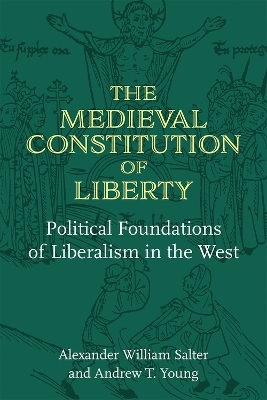
The Medieval Constitution of Liberty
The University of Michigan Press (Verlag)
978-0-472-07601-7 (ISBN)
Why did enduring traditions of economic and political liberty emerge in Western Europe and not elsewhere? Representative democracy, constitutionalism, and the rule of law are crucial for establishing a just and prosperous society, which we usually treat as the fruits of the Renaissance and Enlightenment, as Western European societies put the Dark Ages behind them. In The Medieval Constitution of Liberty, Salter and Young point instead to the constitutional order that characterized the High Middle Ages. They provide a historical account of how this constitutional order evolved following the fall of the Western Roman Empire. This account runs from the settlements of militarized Germanic elites within the imperial frontiers, to the host of successor kingdoms in the sixth and seventh centuries, and through the short-lived Carolingian empire of the late eighth and ninth centuries and the so-called "feudal anarchy" that followed its demise. Given this unique historical backdrop, Salter and Young consider the resulting structures of political property rights. They argue that the historical reality approximated a constitutional ideal type, which they term polycentric sovereignty. Salter and Young provide a theoretical analysis of polycentric sovereignty, arguing that bargains between political property rights holders within that sort of constitutional order will lead to improvements in governance.
Alexander William Salter is Georgie G. Snyder Associate Professor of Economics in the Rawls College of Business at Texas Tech University. Andrew T. Young is Professor of Economics in the Rawls College of Business at Texas Tech University.
List of Illustrations
List of Tables
Acknowledgments
1. Introduction
Part 1: The Historical Backdrop
2. The Fall of Rome and the Rise of the Barbarian West
3. The Carolingian Project
4. The Peace of God
Part 2: The Medieval Constitution: Theory and History
5. Political Property Rights and Constitutional Bargaining
6. Sovereignty and Self-Enforcing Political Property Rights
7. Polycentric Sovereignty
8. Why Western Europe? Why Not Elsewhere?
Part 3: The Medieval Institutions of Liberty
9. Representative Assemblies
10. The Self-Governing Medieval City
Part 4: The Rise of the Nation-State
11. The Tragedy of the Medieval Anticommons?
12. What State Capacity Cannot Do
13. Postscript: The Road Away from Polycentric Sovereignty
14. Appendix: Historiographical Notes
| Erscheinungsdatum | 10.08.2023 |
|---|---|
| Zusatzinfo | 4 figures, 1 table |
| Verlagsort | Ann Arbor |
| Sprache | englisch |
| Maße | 152 x 229 mm |
| Gewicht | 272 g |
| Themenwelt | Geschichte ► Allgemeine Geschichte ► Mittelalter |
| Geisteswissenschaften ► Geschichte ► Regional- / Ländergeschichte | |
| Sozialwissenschaften ► Politik / Verwaltung ► Europäische / Internationale Politik | |
| Sozialwissenschaften ► Politik / Verwaltung ► Staat / Verwaltung | |
| ISBN-10 | 0-472-07601-9 / 0472076019 |
| ISBN-13 | 978-0-472-07601-7 / 9780472076017 |
| Zustand | Neuware |
| Haben Sie eine Frage zum Produkt? |
aus dem Bereich


